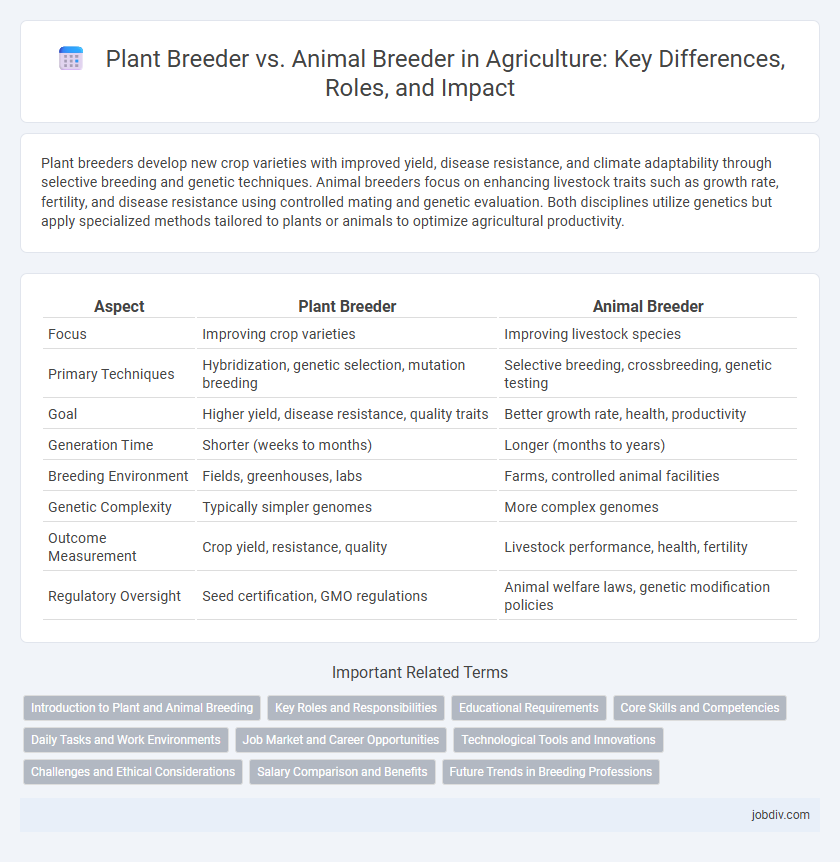Plant breeders develop new crop varieties with improved yield, disease resistance, and climate adaptability through selective breeding and genetic techniques. Animal breeders focus on enhancing livestock traits such as growth rate, fertility, and disease resistance using controlled mating and genetic evaluation. Both disciplines utilize genetics but apply specialized methods tailored to plants or animals to optimize agricultural productivity.
Table of Comparison
| Aspect | Plant Breeder | Animal Breeder |
|---|---|---|
| Focus | Improving crop varieties | Improving livestock species |
| Primary Techniques | Hybridization, genetic selection, mutation breeding | Selective breeding, crossbreeding, genetic testing |
| Goal | Higher yield, disease resistance, quality traits | Better growth rate, health, productivity |
| Generation Time | Shorter (weeks to months) | Longer (months to years) |
| Breeding Environment | Fields, greenhouses, labs | Farms, controlled animal facilities |
| Genetic Complexity | Typically simpler genomes | More complex genomes |
| Outcome Measurement | Crop yield, resistance, quality | Livestock performance, health, fertility |
| Regulatory Oversight | Seed certification, GMO regulations | Animal welfare laws, genetic modification policies |
Introduction to Plant and Animal Breeding
Plant breeding focuses on the genetic improvement of crops to enhance yield, disease resistance, and environmental adaptability using techniques like hybridization and selection. Animal breeding involves the genetic management of livestock to improve traits such as growth rate, fertility, and product quality through controlled mating and genetic evaluation. Both disciplines utilize principles of heredity and genetics but apply species-specific methodologies to optimize agricultural productivity.
Key Roles and Responsibilities
Plant breeders develop new crop varieties by selecting and crossbreeding plants to enhance traits such as yield, disease resistance, and drought tolerance. Animal breeders focus on improving livestock genetics through controlled mating and selection to boost productivity, health, and adaptability. Both professionals conduct extensive research, genetic analysis, and field trials to optimize breeding outcomes and support sustainable agricultural practices.
Educational Requirements
Plant breeders typically require a bachelor's degree in plant science, agronomy, or horticulture, often advancing to a master's or Ph.D. in plant breeding or genetics for research and development roles. Animal breeders generally pursue degrees in animal science, biology, or genetics, with many positions demanding advanced study to specialize in livestock genetics or breeding programs. Both fields emphasize strong knowledge of genetics, biotechnology, and statistical analysis to improve traits and productivity through selective breeding methodologies.
Core Skills and Competencies
Plant breeders possess expertise in genetics, crop physiology, and soil science to develop high-yield, disease-resistant plant varieties. Animal breeders apply knowledge of animal genetics, reproductive physiology, and behavior to improve livestock traits such as growth rate, milk production, and disease resistance. Both require skills in data analysis, selective breeding techniques, and understanding of environmental adaptation to enhance agricultural productivity.
Daily Tasks and Work Environments
Plant breeders conduct daily tasks such as selecting and cross-breeding plants to enhance traits like yield, disease resistance, and climate adaptability, often working in greenhouses, research labs, and field plots. Animal breeders focus on managing genetic traits in livestock through mating programs, performance testing, and health monitoring, typically operating in farms, breeding centers, and agricultural research stations. Both roles require data analysis and record-keeping, but plant breeders' environments emphasize controlled plant growth conditions while animal breeders manage live animal welfare and breeding cycles.
Job Market and Career Opportunities
Plant breeders and animal breeders both play critical roles in agriculture, with plant breeders specializing in developing crop varieties that improve yield, disease resistance, and climate adaptability, while animal breeders focus on enhancing livestock traits such as growth rate, health, and productivity. The job market for plant breeders is expanding due to the rising demand for sustainable agriculture and climate-resilient crops, offering opportunities in research institutions, seed companies, and government agencies. Animal breeders experience steady career prospects primarily in livestock farms, biotechnology firms, and animal genetics companies, driven by the need for improved animal production and welfare standards.
Technological Tools and Innovations
Plant breeders leverage genomic selection, CRISPR gene editing, and high-throughput phenotyping to develop crop varieties with improved yield, disease resistance, and climate adaptability. Animal breeders employ technologies such as artificial insemination, embryo transfer, and genetic marker-assisted selection to enhance livestock traits like growth rate, fertility, and disease tolerance. Both fields increasingly integrate data analytics and biotechnology innovations to accelerate breeding cycles and optimize genetic gains.
Challenges and Ethical Considerations
Plant breeders face challenges such as genetic diversity loss, climate change adaptation, and maintaining crop resilience against pests and diseases, while animal breeders struggle with genetic health issues, welfare concerns, and unintended consequences of selective breeding. Ethical considerations in plant breeding involve sustainable practices and preserving biodiversity, whereas animal breeding ethics focus on animal welfare, preventing inbreeding, and avoiding genetic disorders. Both disciplines must balance productivity goals with long-term environmental and ethical sustainability to ensure responsible agricultural development.
Salary Comparison and Benefits
Plant breeders typically earn an average salary of $60,000 to $80,000 annually, benefiting from roles in crop research and agricultural development with access to bonuses tied to successful cultivar releases. Animal breeders often command salaries ranging from $50,000 to $70,000, with benefits including livestock health improvements and potential profit-sharing from enhanced animal productivity. Both professions offer job stability and opportunities in governmental agencies, universities, and private agricultural firms, but plant breeders may have a slight edge in salary due to the growing demand for sustainable crop varieties.
Future Trends in Breeding Professions
Advancements in genomic technologies and CRISPR gene editing are transforming both plant and animal breeding professions by enabling precise trait selection and faster development cycles. Integrating big data analytics and artificial intelligence enhances predictive breeding models, driving sustainable agricultural production and resilience to climate change. Future trends emphasize multidisciplinary approaches combining genetics, biotechnology, and data science to optimize crop yields and livestock health.
Plant Breeder vs Animal Breeder Infographic

 jobdiv.com
jobdiv.com